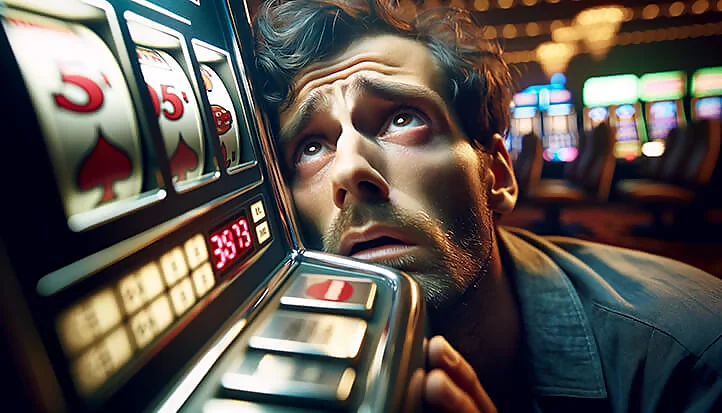Gambling Addiction (ludomania, gambling dependency, or compulsive gambling disorder) is defined as an uncontrollable urge to gamble, which takes precedence over any other interests and daily activities. This condition is characterized by obsessive thoughts about gambling, increased time and money spent on gambling, and the continuation of gambling despite negative consequences.
A person with a gambling addiction can be recognized by a number of symptoms that can seriously affect their daily life. Here are the main ones:
- Constant thoughts about gambling. Frequent thoughts about past gambling sessions, planning the next visit to a casino, slot machine hall, or thinking about where to get money for gambling.
- The need to constantly increase the size of bets to achieve the desired level of excitement or pleasure.
- Failed attempts at self-control. Persistent but unsuccessful attempts to control, reduce, or stop gambling activity.
- Irritability when trying to stop. Feelings of restlessness, irritability, or depression when trying to gamble less or refrain from gambling.
- Escaping reality. Using gambling as a way to cope with problems, relieve stress, or escape from reality.
- Continuing gambling despite problems. Continuing to engage in gambling, even when it causes significant financial, professional, or interpersonal problems.
- Lying about involvement in gambling. Hiding the extent of gambling from family, friends, or therapists.
- Loss of control. Inability to stop or limit gambling addiction despite the desire to do so.
- Risky behavior. Taking high-risk actions, including loans or theft of money for gambling.
- Loss of meaningful relationships or career opportunities. Ruining relationships, losing jobs, or missing educational or career opportunities due to gambling.
It is important to note that the presence of one or more of these symptoms does not necessarily indicate gambling addiction. Proper diagnosis requires consultation with a psychologist. It is also crucial to understand that gambling addiction treatment should be conducted under the guidance of a qualified specialist, as this addiction may overlap with other mental disorders.
The prevalence of gambling addiction varies by region and the diagnostic criteria used, but it is generally considered a relatively rare disorder. Nevertheless, for those suffering from this condition, the consequences can be serious and multifaceted.
Gambling addiction significantly impacts a person’s life, including psychological, financial, and social aspects. Psychological consequences include increased levels of stress, anxiety, depression, and low self-esteem. In some cases, it can lead to the development of other mental disorders.
Financial problems are usually associated with the loss of large sums of money, which can lead to debt, bankruptcy, and other serious economic difficulties. These issues can strain family relationships, leading to conflicts, divorce, or loss of trust from loved ones.
Social consequences include isolation from friends and family, the loss of interpersonal connections, and problems at work or school. Gambling addiction often leads to a reduction in time spent on social interactions, hobbies, or other interests, which decreases the quality of life.

Treatment of Gambling Addiction: Myths and Reality
The treatment of gambling addiction is shrouded in numerous misconceptions and myths, which can significantly complicate the path to recovery. Often, these myths arise from a lack of understanding of the nature of the disorder, stereotypes associated with mental illnesses, as well as general perceptions about gambling and its effects on people. However, for those striving to overcome gambling addiction, it is crucial to separate truth from fiction.
Misconceptions can create false expectations and lead to disappointment during treatment, which in turn reduces motivation and confidence in the possibility of recovery. Additionally, myths about gambling addiction treatment influence society’s perception of the disorder, reinforcing stigma and creating additional barriers for those seeking help.
Dispelling these myths not only helps people with gambling addiction but also contributes to broader awareness and understanding of this complex disorder. Awareness of the realities of gambling addiction treatment is critical to creating effective approaches to recovery and supporting those facing this problem.
Myth 1: “Gambling addiction is not a real illness”
The myth that gambling addiction is not a real illness is widespread and often viewed as an excuse for unbridled or irrational behavior. However, scientific research and medical data from recent decades debunk this myth, confirming that gambling addiction is a serious mental disorder that requires attention and treatment.
It is important to understand that gambling addiction is classified as an impulse control disorder, characterized by a compulsive urge to gamble despite negative consequences. This condition leads to a significant deterioration in the quality of life, including financial difficulties, the breakdown of personal relationships, and mental health problems.
Diagnostic manuals such as the DSM-5 (Diagnostic and Statistical Manual of Mental Disorders, published by the American Psychiatric Association) recognize gambling addiction as a “Gambling Disorder.” This confirms that gambling addiction is not merely a matter of weak willpower or lack of moral character but a serious and well-studied medical condition.
Ignoring gambling addiction as a real illness leads to a lack of necessary help and support for those suffering from this disorder. Understanding and acknowledging gambling addiction as a legitimate mental disorder is a key step toward developing effective treatment strategies and providing assistance to those in need.
Myth 2: “Gambling addiction cannot be cured”
The myth that gambling addiction cannot be cured is one of the most common misconceptions, which can seriously hinder people from seeking and receiving the necessary help. In reality, although gambling addiction is a complex disorder, there are many effective treatments that help people overcome this addiction.
Gambling addiction treatment usually involves a comprehensive approach that combines psychotherapy, behavior correction, and, in some cases, medication. A key component is cognitive-behavioral therapy (CBT), which helps change negative thought processes and behavior patterns associated with gambling. CBT focuses on overcoming irrational beliefs and developing strategies to limit gambling-triggering situations.
Additionally, family therapy can also be an important part of treatment, as gambling addiction often affects not only the gambler but also their loved ones.
It is important to understand that although complete recovery can be difficult and time-consuming, many people successfully manage their gambling addiction and return to a normal life. The recovery path varies for each person, and success often depends on personal motivation, support availability, and the application of effective treatment strategies.
Myth 3: “Only weak-willed people suffer from gambling addiction”
The myth that gambling addiction affects only weak-willed people is another common misconception that is not only incorrect but also harmful, as it simplifies a complex psychological and neurobiological disorder, reducing it to a matter of willpower.
In reality, gambling addiction is a complex disorder that can affect people regardless of their personal qualities, willpower, or social status. Like many other forms of addiction, gambling addiction involves changes in the brain, particularly in systems responsible for reward and motivation. These changes can affect a person’s ability to make rational decisions and manage impulses, making the problem more complicated than just a lack of willpower.
Additionally, multiple factors can contribute to gambling addiction, including genetic predisposition, psychological problems such as depression or anxiety, as well as social and cultural factors. These aspects completely shatter the stereotype that only weak-willed individuals suffer from gambling addiction.
Dispelling this myth is crucial not only for allowing people with gambling addiction to seek and receive help without fear of judgment but also for society to better understand and support those struggling with gambling dependency. Recognizing that gambling addiction is a serious and complex disorder requires a compassionate, evidence-based approach to treatment and support.
Evidence and Research Supporting the Reality of Gambling Addiction and Its Treatment
The evidence and research supporting the reality of gambling addiction and its treatability are based on extensive scientific work, including neurobiological, psychological, and clinical studies. These data help understand the nature of gambling addiction and develop effective treatment approaches.
- Neurobiological research. Numerous studies show that gambling addiction is associated with certain changes in the brain, similar to those observed in other addictions. For example, research using functional magnetic resonance imaging (fMRI) and positron emission tomography (PET) has revealed abnormalities in areas of the brain associated with reward, motivation, and impulse control in people with gambling addiction.
- Psychological research has identified specific cognitive and emotional characteristics associated with gambling addiction, including an increased tendency toward the illusion of control, irrational beliefs, and problems with emotional regulation.
- Clinical research on the effectiveness of various treatments, including cognitive-behavioral therapy (CBT), pharmacotherapy, and self-help programs, demonstrates positive outcomes in treating gambling addiction. CBT, for example, has shown effectiveness in changing negative thought patterns and behavior strategies related to gambling.
These studies and evidence are the cornerstone of understanding gambling addiction as a serious mental disorder and in developing effective treatment approaches. They also help dispel stereotypes and misunderstandings surrounding this condition, emphasizing the importance of providing people with gambling addiction access to qualified help and support.

How to Treat Gambling Addiction: Real Methods
Treating gambling addiction is a complex process that requires an individual approach and understanding of the unique needs of each person. Despite the difficulties, there are effective methods to help overcome this condition. These methods include various forms of therapy, self-help strategies, and, if necessary, medication. The key to success lies in a comprehensive approach that addresses both the physical and psychological aspects of gambling addiction.
One of the important steps toward recovery is acknowledging the problem and being willing to work on it. In many cases, successful treatment begins with the realization that gambling addiction is not just a bad habit, but a serious illness that requires professional intervention. Gambling addiction affects not only a person’s behavior but also their thinking, emotions, and lifestyle.
In the treatment process, much attention is paid to addressing the underlying causes of gambling addiction and developing strategies to avoid situations that contribute to gambling behavior. The goal is to help the person develop new, healthy ways to cope with stress and emotional issues that previously led to an overwhelming desire to gamble.
Cognitive Behavioral Therapy (CBT)
Cognitive Behavioral Therapy (CBT) is one of the most effective psychotherapeutic methods for treating gambling addiction. CBT is based on the concept that our thoughts influence our behavior and emotions, and changing thought patterns can lead to changes in behavior and emotional states.
In the context of treating gambling addiction, CBT focuses on identifying and changing irrational and negative thoughts that contribute to gambling behavior. For example, a patient may believe they can control the outcome of the game or that making larger bets will lead to significant winnings despite previous losses. Therapy helps clients recognize these misconceptions and develop more rational and healthy ways of thinking.
CBT also involves developing strategies to deal with situations that may trigger the urge to gamble. This can include learning relaxation techniques, developing stress management skills, improving interpersonal relationships, and learning problem-solving methods. Additionally, an important part of therapy is teaching techniques for self-control and self-awareness, which helps prevent relapses.
CBT is often conducted in an individual format but can also be applied in group therapy. The duration and frequency of sessions depend on the individual needs and severity of the gambling addiction.
The effectiveness of Cognitive Behavioral Therapy in treating gambling addiction is supported by numerous studies showing that it helps reduce the frequency and intensity of gambling behavior as well as associated psychological issues such as anxiety and depression.
Pharmacotherapy
Pharmacotherapy, or medication treatment, can be used as part of a comprehensive approach to treating gambling addiction, especially in cases where it is accompanied by other mental disorders such as depression, anxiety, or mood disorders. It’s important to note that there are currently no specific medications approved solely for the treatment of gambling addiction, but some medications used to treat other disorders have shown promising results here.
- Antidepressants: SSRIs (Selective Serotonin Reuptake Inhibitors), such as fluoxetine, may be prescribed to treat co-occurring depressive symptoms or obsessive-compulsive disorder, which can exacerbate gambling addiction.
- Mood Stabilizers: In some cases, especially when gambling addiction is accompanied by mood swings, mood stabilizers such as lithium may be prescribed.
- Addiction Treatment Medications: Some studies suggest that medications used to treat other types of addiction, such as naltrexone (a drug for treating alcohol and opioid addiction), may be effective in reducing impulsivity and gambling urges.
- Antipsychotics: In rare cases where gambling addiction is accompanied by psychotic symptoms, atypical antipsychotics may be prescribed.
It’s important to emphasize that pharmacotherapy should be administered under the strict supervision of a qualified medical professional. Before starting any pharmacotherapy, a thorough assessment of the patient’s condition should be conducted, including potential side effects and interactions with other medications. In some cases, pharmacotherapy is combined with psychotherapy to achieve the best results.
Family Therapy and Involvement of Loved Ones
Family therapy and active involvement of loved ones play a key role in the treatment process of gambling addiction. This approach is based on the understanding that gambling addiction affects not only the individual but also their family relationships and close ones. Involving the family in the treatment process can help create a supportive and understanding environment conducive to recovery.
In family therapy, various aspects are addressed, including:
- Communication: Improving communication between family members helps express feelings and needs, as well as resolve conflicts that may contribute to or worsen the gambling problem.
- Understanding the Nature of Addiction: The educational part of therapy helps family members understand what gambling addiction is, how it affects the individual, and what strategies can help overcome this addiction.
- Developing Support Strategies: Family therapy allows family members to develop effective ways to support the gambler, including setting healthy boundaries and providing emotional support.
- Addressing Family Problems: Sometimes gambling addiction is linked to deeper family issues. Therapy helps identify and address these issues, thus contributing to the overall well-being of the family.
- Overcoming Related Difficulties: Families often face financial, legal, and social issues due to the gambling addiction of one member. Family therapy helps develop a plan to overcome these difficulties.
Family therapy usually involves regular sessions with a psychologist or psychotherapist, where family members can openly discuss their experiences and seek solutions. This approach not only promotes the recovery of the gambler but also strengthens family relationships, creating a healthier and more harmonious family environment.

How to Treat a Gambler at Home?
Treating gambling addiction at home can be challenging and requires a comprehensive approach, including lifestyle and behavioral changes, as well as self-help methods. Nevertheless, here are some steps that can be taken independently:
- Acknowledge the problem: The first step to recovery is recognizing that gambling addiction is a problem and needs attention.
- Information support: Learn more about gambling addiction to better understand the nature of the addiction and its consequences.
- Creating a healthy environment: Remove all gambling apps from devices and avoid places where gambling is available.
- Self-control and setting boundaries: Set limits on the time and money you can spend on games, and stick to them strictly.
- Finding alternative activities: Find hobbies or activities that can replace gambling and provide pleasure.
- Social support: Discuss the problem with friends and family, and ask for their support and understanding.
- Self-help and support groups: Join support groups, such as Gamblers Anonymous, where you can communicate with people facing similar problems.
- Stress management: Learn stress management techniques such as meditation, yoga, or deep breathing to cope with triggers that cause the urge to gamble.
- Improving physical health: Regular physical exercise and a healthy diet improve overall well-being and reduce stress.
- Addressing underlying causes: Try to understand the underlying causes of the addiction, such as depression, anxiety, or relationship problems, and work on resolving them.
Remember, self-treatment is not always effective, especially in severe cases. In such situations, it is necessary to seek help from a qualified professional who can provide professional assistance and support.

The Role of Society and Mass Media
The influence of society and mass media on the perception and treatment of gambling addiction cannot be underestimated. The images and messages we encounter daily shape our understanding and attitude towards various aspects of life, including mental disorders such as gambling addiction. The way this issue is portrayed in the news, films, television, and social media determines how seriously society views gambling addiction and how accessible and acceptable help is for gamblers.
Mass media plays a crucial role in shaping public opinion. It can either contribute to spreading myths and stereotypes or serve as a tool for education and enlightenment. Highlighting success stories, educational programs, and information campaigns can significantly raise awareness about the nature of gambling addiction and the available treatments.
Public opinion, often influenced by the media, also plays an important role. Support from society can greatly ease the process of seeking help for gamblers and help overcome the stigma and misconceptions surrounding this disorder.
How societal perceptions influence the view of gambling addiction?
Societal perceptions greatly influence how gambling addiction is viewed, affecting how society approaches both the condition and its treatment. If gambling addiction is perceived as a sign of weak will or moral shortcomings, it can lead to stigmatization. This perception makes it harder for gamblers to acknowledge their problem and seek help due to fear of judgment or misunderstanding.
Widespread misconceptions and a lack of accurate information about the nature of gambling addiction often lead to misunderstandings about what gambling addiction is, why it occurs, and how to treat it. Insufficient public awareness about the mechanisms behind the development and treatment of gambling addiction perpetuates myths and erroneous beliefs that hinder effective approaches to treatment and support. Gamblers may delay seeking help, fearing misjudgment of their condition.
Additionally, mass media plays a significant role in shaping public opinion about gambling addiction. Media depictions of gambling addiction are often oversimplified or dramatized, leading to further misunderstanding and stigmatization. In some cases, media focus on extreme and unusual stories, ignoring the broader context and serious consequences many gamblers face.
This not only affects how society views gambling addiction but also impacts healthcare policy and the allocation of resources for treatment and research. Public opinion can pressure policymakers and healthcare organizations, raising or lowering the prioritization of the issue in the public agenda.
The importance of educational campaigns in debunking myths
Educational campaigns play a key role in debunking myths about gambling addiction and have a significant impact on public consciousness and approaches to treating this disorder. They promote the spread of accurate information, which is critical for several reasons:
- Raising awareness. Educational campaigns increase awareness about what gambling addiction is, how it affects individuals and their families, and what treatment options are available. This helps society better understand and empathize with those suffering from this disorder.
- Reducing stigma. Providing accurate information about gambling addiction helps combat the stigma often associated with the disorder. When people understand that gambling addiction is a serious mental health condition, not just a matter of personal choice or weak will, they are more likely to show compassion and understanding towards gamblers.
- Support and assistance. Campaigns inform the public about where and how gamblers can seek help. By knowing about available resources, people are more likely to actively seek support.
- Influence on health policy. Raising public awareness can lead to changes in healthcare policies and increased investment in research and the development of more effective treatments for gambling addiction.
- Prevention. Debunking myths and increasing understanding of gambling addiction can help prevent this disorder, especially among vulnerable populations like adolescents and young adults.
Ultimately, educational campaigns play an important role in forming a healthier, more informed society, where gambling addiction is approached with understanding and compassion rather than judgment and stigmatization.

Stories of successful gambling addiction recovery
Real examples of people who have successfully overcome gambling addiction inspire and demonstrate that recovery is possible, despite the challenges. Here are a few success stories:
- Sergey was addicted to online casinos for many years. He lost significant amounts of money, leading to problems in his family and at work. Realizing that his life was spiraling out of control, Sergey sought help from an addiction specialist. Through cognitive-behavioral therapy and regular support group meetings, he managed to overcome his addiction and restore his family relationships.
- For Maria, slot machines became a way to cope with work stress. Over time, this turned into a daily necessity. When her financial situation worsened, she realized she had become addicted to gambling and needed help. By consulting a psychotherapist and actively participating in family therapy, Maria was able to understand the root of her problem and develop new strategies for dealing with stress. She now lives without gambling and is actively involved in volunteering, helping others with similar problems.
- Student Bogdan became addicted to sports betting. What began as a hobby quickly turned into an addiction, causing him to skip classes and lose friends. After a serious talk with his parents, Bogdan decided to undergo a treatment program and joined a Gamblers Anonymous group. Gradually, he was able to regain control of his life and return to his studies.
- Liza, who worked as a nurse, developed a gambling addiction after starting to play online bingo to relax and unwind from daily life. Over time, her hobby led to serious debts. Realizing she couldn’t deal with the problem on her own, Liza sought help from a psychologist, and through individual therapy, she learned to manage her impulses and found new ways to relax.
These stories demonstrate that with the right support and treatment strategies, people can overcome gambling addiction and return to a fulfilling life.

Conclusion
In summarizing the importance of correctly understanding and treating gambling addiction, I want to highlight several key points. Firstly, gambling addiction is a serious mental disorder that requires a comprehensive and individualized approach. Understanding this will help society overcome stereotypes and approach the problem with compassion and professionalism.
Secondly, effective treatment for gambling addiction includes various methods such as cognitive-behavioral therapy, family therapy, support groups, and in some cases, pharmacotherapy. These methods not only aim to overcome the gambling addiction itself but also address the underlying causes and consequences of the disorder.
Thirdly, it is important to emphasize the role of educational campaigns and mass media in debunking myths and providing accurate information about the nature and treatment of gambling addiction. Proper coverage of this issue can significantly influence societal attitudes toward gamblers and improve access to quality help and support for those in need.

Recommended Reading
- “Gambling: The Hidden Addiction — Overcoming Gambling Addiction” – Author Kerry Dennis shares tips and strategies that will help readers on their path to recovery, useful both for those beginning their recovery and those who have been struggling with gambling addiction for a long time.
- “All Bets Are Off: Losers, Liars, and Recovery from Gambling Addiction” – Authors Arnie Wexler, Sheila Wexler, and Steve Jacobson tell the story of Arnie Wexler, a former gambler, and his journey to recovery. The book offers valuable lessons and practical advice based on personal experience.
- “The Easy Way to Stop Gambling: Take Control of Your Life” – Author Allen Carr. Allen Carr, known for his easy method to quit smoking, applies his strategies to the problem of gambling addiction. The book aims to change the reader’s mindset regarding gambling.
- “Change Your Gambling, Change Your Life: Strategies for Managing Your Gambling and Improving Your Finances, Relationships, and Health” – Author Howard Shaffer. This book offers strategies for changing gambling behavior and improving financial standing, relationships, and health.
- “Addiction by Design: Machine Gambling in Las Vegas” – Author Natasha Dow Schüll. The book explores the impact of the design and functioning of slot machines on the development of gambling addiction and how gamblers are drawn into the gaming process. The author describes in detail how slot machines and the casino environment are specifically designed to intensify addiction and keep players engaged.
Each of these books offers a unique perspective on the problem of gambling addiction, presenting personal stories of struggle and recovery, as well as professional advice and analytical research. They can be useful both for those suffering from gambling addiction and for professionals working in this field.




